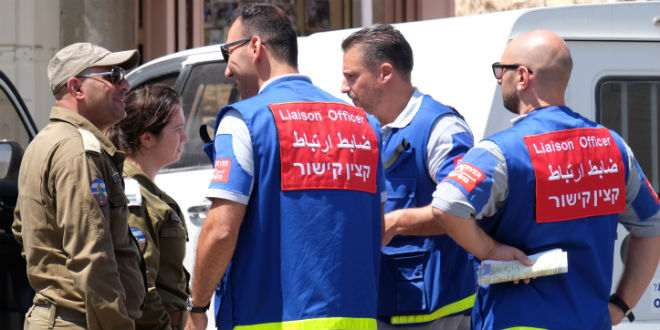Israel’s Prime Minister Benjamin Netanyahu announced on Monday that he will not renew the mandate of the international observers in Hebron, leading a similar group to announce its departure as well. The Israeli government claims the groups exacerbate the tensions in the city by advancing a pro-Palestinian biased image of the situation in the city.
Netanyahu announced that the Temporary International Presence in Hebron (TIPH), a foreign-funded NGO, will not be permitted to continue to operate in Israel.
“We will not allow the continuation of an international force that acts against us,” Netanyahu said in the statement announcing the decision.
Staffed by approximately one dozen personnel from Italy, Norway, Sweden, Switzerland and Turkey, the TIPH was established in 1994 with the mandate to report on humanitarian violations.
The mandate of the TIPH describes its purpose as being for the benefit of the Arab residents, “to promote by their presence a feeling of security to the Palestinians of Hebron.” They achieve this by observing the IDF stationed in the city, reporting on cases in which they feel the military has breached any rules or harassed the Arab residents.
Nabil Abu Rudeineh, Palestinian Authority President Mahmoud Abbas’s spokesman, criticized the decision by the Israeli government.
“We will absolutely not accept this,” Rudeineh said in a statement. “We call on the countries that sponsored the signing of these agreements to take a clear stance regarding this dangerous Israeli move and to immediately put pressure on the Israeli government to continue their implementation.”
The decision was hailed by right wing Israeli politicians. Public Security Minister Gilad Erdan said TIPH members had “cooperated with extremist organizations and promoted delegitimization of Israel.”
Jewish Home lawmaker Moti Yogev said the observer “was made up of Israel-haters, was one-sided and recently even harmed Jews and Jewish property in Hebron.”
The Israeli decision was also criticized by the Norwegian government.
“The one-sided Israeli decision can mean that the implementation of an important part of the Oslo accords is discontinued,” Foreign Minister Ine Eriksen Soereide said in a statement to Reuters.
“The situation in Hebron is unstable and characterized by conflict,” she said, adding that the end of the observer mission, which Norway has led for the past 22 years, was, therefore, “worrying.”
In light of the imminent departure of the TIPH, the World Council of Churches (WCC) announced on Tuesday that it would be pulling its international “ecumenical accompaniers” from Hebron due to “security concerns.”
The WCC’s Ecumenical Accompaniment Programme in Palestine and Israel (EAPPI) was founded in 2002 to monitor and report human rights abuses. The WCC has been accused of promoting anti-Israel rhetoric and supporting the Boycott Divestment Sanctions movement.
Matan Peleg, the head of Im Tirtzu, a right-wing Israel advocacy group, welcomed this announcement.
“These organizations do nothing apart from fuel the fires of conflict and provoke IDF soldiers, and they are the true obstacle to peace. We are pleased that our efforts to ‘film the filmers’ succeeded, and we promise to continue working on behalf of IDF soldiers and the State of Israel.”
The Israeli government began investigating the possibility of removing the TIPH in November. Israel’s Deputy Foreign Minister Tzipi Hotovely, tasked with investigating the matter wrote a scathing report about the TIPH to Netanyahu.
“The presence of the TIPH force in Hebron causes significant harm to IDF soldiers and the residents of the Jewish community in Hebron, and is inconsistent with Israeli interests,” Hotovely wrote in a letter to Netanyahu. “The mission has become a hostile presence on the ground, and it now sees itself solely as a critic of the IDF, while blatantly ignoring Palestinian terrorist activity in the area.
She wrote that “recently, TIPH observers have taken things further: They no longer suffice with unilateral reports against the IDF, but rather employ actual violence against Jews. As we [the government] will soon be required to decide on whether to extend the TIPH mandate, my recommendation is that we do not do so.”
There is open enmity between the TIPH personnel and the Jews of Hebron but several incidents over the last 18 months or so indicated that the situation had deteriorated even further. In July 2017, a TIPH employee was filmed puncturing the tires of a car owned by a Jewish family. In July 2018, the legal counsel of the TIPH was filmed slapping a 10-year-old Jewish boy across the face.
Last week, the Israeli police issued a report claiming that TIPH members were “deliberately creating friction to justify their high salary.” The police report cited the TIPH with disrupting IDF soldiers’ work at checkpoints and with regularly confronting troops.
Last year, the organization’s confidential report marking 20 years of observing in the city declared the Jewish presence in Hebron to be in violation of international law.
Despite their pro-Palestinian/anti-Israel mandate, the TIPH has been attacked by the Arab residents several times. In March 2002, two observers were killed and another wounded by Arab gunmen near the village of Halhul. In February 2006, staffers were forced to flee when an Arab mob attacked the TIPH office.
The organization has also been accused of corruption and cover ups as well as a number of complaints alleging its members are violently targeting the Jewish community in Hebron.
Hebron is the second holiest city to the Jews and the Bible describes how Abraham purchased it for his descendants.
The Hebron Protocol of 1997 signed between Israel under the Palestinian Liberation Organization divided the city into two sectors: H1, controlled by the Palestinian Authority and H2, roughly 20 percent of the city, administered by Israel. Jews are not permitted to live in the H1 area and the H2 area is populated by an Arab majority with approximately 500-800 permanent Jewish residents.
Source: Israel in the News

